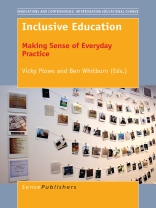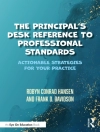‘Inclusive education has emerged internationally over the past thirty years as a way of developing democratic citizenship. Core to inclusive principles are that improved equity in education can only be achieved by eliminating the economic, cultural and physical barriers that currently impede learning for particular students.
To strengthen inclusive practice to this end inexorably requires that we attempt to make sense of it in its current form: to examine how it is enacted in educational settings from early childhood, schools, and communities and further and higher education; to contemplate the restrictions that it might inadvertently create; and to consider its effects on members of educational communities.
Contributions to this edited collection represent diverse perspectives, yet share a commitment to challenging existing forms of educational marginalisation through policy, practice, theory and pedagogy. The chapters emerged from discussions at the inaugural Inclusive Education Summit that was held at Victoria University, Australia in 2015. They present research that was conducted in Australia, New Zealand, Indonesia, Bangladesh, Spain and the UK—illustrating transnational interests and diverse approaches to practice.
Presented in four sections—provocations, pushing boundaries, diverse voices, and reflections, the chapters explore everyday practice across a range of contexts: from educating culturally and linguistically diverse, refugee, and/or socially and economically disadvantaged students, to issues of diversity brought about by and through gender, giftedness and disability. The book will appeal to academics, students and practitioners in disciplines including: education, sociology, social work, social policy, early childhood, disability studies, and youth studies.’
Tabella dei contenuti
Part 1: Provocations.- Making Sense of Everyday Practice: By Whom, for Whom, for What?.- Understanding Inclusive Pedagogy: Learning with and from Teachers.- Part 2: Pushing Boundaries.- Inclusive Education, Subjectivities and the Posts.- Approaching Play and Inclusion.- The Meena Communicative Initiative in Bangladesh: From Gender to Disability.- On the Edge?: Counter-Practice in Flexible Learning Programs.- Including Students from Refugee Backgrounds in Australian Schools.- Alice in Wonderland: Opening the Doors to Inclusive Practices of Teaching and Learning for All Students.- Part 3: Diverse Voices.- Mentors and Mentees Working Together to Develop Institutional Capital: The Equity Buddies Support Network.- Dyslexia and Learning: An Insider Account of Negotiating Barriers and AIDS in Secondary Education.- “You Don’t Realise You Do That”: Teachers’ Reflections on Developing Inclusive Classrooms.- “Why I Am Chosen as Inclusion Child?”: Listening to Students’ Voice on School Experiences of Inclusion in Indonesia.- Informed Visual Narratives from the Inside: Students’ Viewpoints on Inclusionary Practice.- Parents’ Lived Experiences of Teachers’ Construction of Giftedness: Is Meritocracy Part of the Problem?.- Part 4: Reflections.- Inclusive Education: Two Steps Forward and One Step Back.- Afterthought No Longer.












